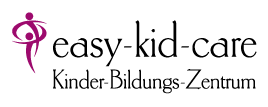Bilingualism
Bilingualism & immersion method
What does bilingual mean?
Bilingual means speaking two languages: Bi = two, Lingua = language. The term does not relate to any specific method – bilingualism can be achieved by means of a number of teaching and learning methods.
Immersion method in learning a foreign language
By far the most effective method for learning a language, and that which is best suited to children, is the immersion method. Immersion means submerging oneself into a language. In this method, the new language is the working and conversational language, and according to the principle “One person – one language” one carer speaks only German, while the other speaks only English. Everything that the foreign language teacher says is reinforced by means of mimicry, gestures or pointing, but not by translating.
The child thus learns the language independently, step by step, from the context of the situation.
 This is the most natural method for children to learn, irrespective of whether it is the first or the second language. Immersion is therefore more child-friendly than every other method. It motivates and succeeds without compulsion or the pressure to perform. It has been proven scientifically that immersion leads to a considerably higher level in the foreign language than with other conventional language learning methods. At the same time, the native language and general knowledge develop just as well, or even better, than among children who grow up with just one language. Immersion learning does not overextend children, because the language is not made into an issue and neither grammar nor vocabulary is at the forefront. No corrections to the language are made. This makes learning the language free from pressure. At present immersion learning is the most successful method in the world for learning a language. It means that a lot of time is spent with the new language.
This is the most natural method for children to learn, irrespective of whether it is the first or the second language. Immersion is therefore more child-friendly than every other method. It motivates and succeeds without compulsion or the pressure to perform. It has been proven scientifically that immersion leads to a considerably higher level in the foreign language than with other conventional language learning methods. At the same time, the native language and general knowledge develop just as well, or even better, than among children who grow up with just one language. Immersion learning does not overextend children, because the language is not made into an issue and neither grammar nor vocabulary is at the forefront. No corrections to the language are made. This makes learning the language free from pressure. At present immersion learning is the most successful method in the world for learning a language. It means that a lot of time is spent with the new language.
Why is immersion learning child-friendly?
Because immersion learning leads the child to the language without any pressure; because immersion allows children to go at their own pace; because immersion allows intuitive language learning; because immersion lessons are very varied and thus individual; because immersion learning does not make the language into an issue, but rather language is the tool.
Will my child be overextended with two languages?
No. Humans are designed to be multilingual, and not monolingual. Quite the opposite: contact with a second language in early years is good, as it encourages mental development and even helps the child to speak its native language better. This is because the capabilities needed to acquire a language benefits both languages. Less than a third of humanity grows up monolingually. Languages are learned well when a lot of time is spent with the language and the contact is varied. If a child-friendly method, such as immersion, is chosen, there is no reason to worry about overextension. A second language fundamentally encourages the cognitive (mental) development of the child.
It is also not necessary for a language to be complete before a second one can be added. Speech therapists confirm that the formation of sounds in both languages is encouraged identically.
Do I need to practice with my child, if two languages are spoken in the children’s educational centre?
No, that is neither necessary nor desirable. Learning programmes are not adapted to age. Children learn languages intuitively by – as in their native language too – understanding things from their context. Naturally you can support your child, for example when it enjoys story books, with which it is occupied at easy-kid-care and therefore expand its library. However, your child should decide on its own initiative to look at the book and not be put under pressure.
It is, however, more important that you, as a parent, look after the native language at home: read aloud a lot and talk a lot with the children. If the native language is well developed, that is a good prerequisite for learning another language.




